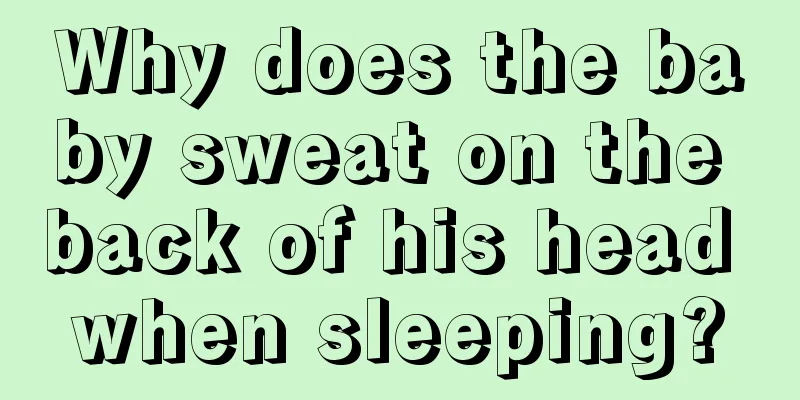Why does the baby sweat on the back of his head when sleeping?

|
Along with the joy that the baby brings to the parents, it also brings a lot of troubles to many parents. Due to the lack of experience in taking care of babies, there are many times when many new mothers always don’t know how to take better care of the baby. Sometimes they are helpless when the baby has some symptoms. Sweating on the back of the head when the baby sleeps is a symptom that many babies have. There are many reasons for this symptom, such as we usually dress the baby too much, etc. Let us understand why the baby sweats on the back of the head when he sleeps. Why does the baby sweat on the back of his head when sleeping? Excessive secretion of sweat glands is called hyperhidrosis. Excessive sweating is a common symptom in infancy and childhood. Some infants sweat excessively during daytime activities, some sweat excessively when just going to bed, and some sweat excessively in the second half of the night. Some of these hyperhidrosis are physiological, while others may be pathological. Parents should correctly distinguish between physiological and pathological hyperhidrosis based on the characteristics of their children's hyperhidrosis. The secretion of sweat glands is related to the excitability of the sympathetic nerves and is not directly controlled by the parasympathetic nerves. Therefore, any cause that can increase the excitability of the sympathetic nerves can cause excessive sweating. 1. Physiological hyperhidrosis refers to sweating during sleep when the child is well-developed, healthy, and has no disease. The reason is that children's brain nerves are not yet fully developed, and children are in the period of growth and development. Their body metabolism is very active. If they are a little excited and stimulated, they will sweat to evaporate the heat in the body and maintain normal body temperature. Parents are often accustomed to deciding the best environmental temperature for their children based on their own subjective feelings, and like to cover their babies with more blankets and keep them tightly covered. The baby is overheated and can only regulate his body temperature by sweating. In addition, drinking milk, eating chocolate, etc. before going to bed can also cause excessive sweating in children. Physiological hyperhidrosis is more common in the head and neck, often occurring within half an hour after falling asleep, and sweating stops in about an hour. 2. Pathological hyperhidrosis refers to hyperhidrosis that occurs in a quiet state. The hyperhidrosis caused by rickets is manifested as excessive sweating on the head. Sweating increases during breastfeeding and after falling asleep, and gradually disappears after a deep sleep. It has nothing to do with the season. Weak and sick children often sweat excessively on their head, chest, and back during daytime activities or after falling asleep at night. This is more common in children around one year old and children before and after weaning. Insufficient food intake or inadequate absorption and utilization of food due to improper feeding can also cause malnutrition and excessive sweating. If your baby often sweats before dawn or in the early morning when he is empty stomach, it may be caused by hypoglycemia. At this time, you can give him sugar water or cakes to eat, and the sweating will stop. If a child often sweats in the second half of the night, this sweating is often called "night sweats", which is a common symptom of tuberculosis. It is caused by the toxins produced by the tuberculosis bacteria in the body stimulating the body's sympathetic nerves and making them excited. The main areas of sweating are the chest and back. It must be pointed out that if the baby often sweats profusely for unknown reasons or sweats on one side or the lower body, he should go to the hospital for further examination and treatment. Home care: For children with excessive sweating, it is important to pay attention to skin care, take a bath or sponge bath frequently, change underwear, keep the skin clean, and prevent blockage of the sweat gland ducts from causing sweat rash or boils, or erosion in the skin folds, which may cause secondary skin infection. Talcum powder should be used appropriately, as excessive use may cause irritation to the skin. If your child sweats a lot, you should let him drink more water to replenish the lack of water in the body. If it is pathological hyperhidrosis, the primary disease should be treated actively. Children are particularly important to every family. It is because of the existence of children that the whole family is filled with warmth and happiness. By understanding why babies sweat on the back of their heads when they sleep, I hope it will be helpful to many new mothers. Don’t always be at a loss when you encounter babies sweating on the back of their heads when they sleep. Find out what causes it. If the baby has a physical illness, treat it in time. |
<<: Why does the back of the head sweat when sleeping?
>>: Is yogurt good for babies?
Recommend
How to treat and improve cough and runny nose in infants and young children
Coughing in infants and young children is a commo...
Eight month old baby shaking his head
Many babies always shake their heads inadvertentl...
What to do if a one and a half year old baby has red bumps on his body
We all know that once there is a skin problem, it...
What causes tailbone pain in children?
Sometimes, pain in a child's coccyx cannot be...
Effects of electric drill noise on newborns
The electric drill is a relatively common tool. T...
What causes children to sweat a lot while sleeping?
Many careful parents always observe some subtle d...
Whooping cough symptoms in children
Whooping cough in children is a common disease in...
Introduction to dietary therapy for children's cough
Children always have various problems due to poor...
What to do if your child has a fever and refuses to take medicine
A child's body is still in the development st...
Four reasons for children's tooth decay, children's oral hygiene should pay attention to
If you are a parent of a child, then you will kno...
What are the symptoms of infantile convulsions?
Infantile convulsions are not unfamiliar to many ...
What should I do if my child has a foreign object stuck in his throat?
As babies grow older, they are full of curiosity ...
How to make baby fish soup?
Nowadays, almost every family has only one child,...
One and a half year old baby keeps falling down while walking
It is normal for one and a half year old babies t...
What are the treatment options for children’s teeth?
What are the methods for treating children's ...









